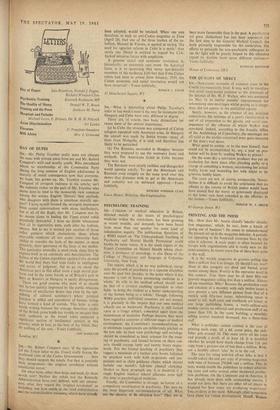PSYCHIATRIC TRAINING
SIR,—Criticism of medical education in Britain. directed mainly at the status of psychological
medicine within the curriculum, has been growing in recent months, and demands have been heard from more than one quarter for some kind of
independent inquiry. The publication, therefore, of a WHO report on 'The Undergraduate Teaching of Psychiatry and Mental Health Promotion' could hardly be more timely. It is the ninth report of the Expert Committee on Mental Health whose chair- man, a professor of neurology, is also Dean of the College of Physicians and Surgeons at Columbia University, Ncw York.
The report, which is in no way polemical, recost nises the growth of psychiatry as a separate discipline over the past two decades, to the point where it has become 'a sort of leaven permeating medicine as a Whole.' Its role in the medical school should now be that of a catalyst enabling specialists in other fields 'to bring the student to a better understanding of the human being as a whole.' Though, following WHO practice, individual countries are not named. it is precisely in this respect that our own medical schools are so backward. Psychiatry is still looked upon as a fringe subject. somewhat apart from the mainstream of medicine. Perhaps because they must have regard to countries at different stages of medical Cevelopment, the Committee's recommendations as to minimum requirements are deliberately pitched on the low side. In their view psychology and sociology should be considered as basic sciences for the train- ing of psychiatry, and formal lectures on these sub- jects should occupy forty and twenty hours respec- tively. For the formal teaching of psychiatry they suggest a minimum of a further sixty hours, followed by practical work with both in-patients and out- patients and in child guidance clinics, which should include one month's full-time clinical clerkship. Modest as these proposals are. it is doubtful if a single English medical school allocates even half this time to psychological medicine.
Finally, the Committee is strongly in. favour of a compulsory examination in psychiatry. This may be the most important recommendation of all. What are the chances of its adoption here? They are at least more favourable than in the past: A psychiatrist (of great distinction) has just been appointed for the first time to the General Medical Council, the body primarily responsible for the curriculum. His efforts to persuade his non-psychiatric colleagues to see tht light will be greatly helped by this objective report by doctors from seven different nations.— Yours faithfully.






































 Previous page
Previous page